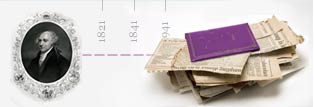Family History Articles
Articles from "Discover My Past"
- Military research online
- Find Your Firemen Forebears
- Online Marriage Records
- The Parish Chest
- The Poor Law
- What secrets our ancestors' autograph books might reveal
- Romany Collections at Leeds and Liverpool
- Destination Unknown
- Pity the Poor Lodger
- Jewels of the British Library: Discover your ancestors in the India Office Records
Chris Paton brings you the best resources to trace your military ancestors.
Tracing ancestors who worked in the fire briga ...
Chris Paton investigates the best resources
Chris Paton looks beyond the parish registers The Church of England was an intensely bureaucratic establishment. Quite apart from the ecclesiastical hierarchy of priests, deacons and bishops, each parish had its own officers handling a variety of responsibilities. The most important establishment was the vestry, essentially the church's council, which dealt with many different types of day to day business. Often chaired by the minister, it worked in conjunction with the local justice of the peace on a range of issues, and in many cases the minutes have survived for centuries.
Michelle Higgs investigates poor relief before and after 1834
Ruth A Symes asks what secrets our ancestors' autograph books might reveal
Rachel Bellerby looks at two outstanding research centres
Emma Jolly looks at the records of wartime evacuees. Operation Pied Piper was the government’s codename for the evacuation of millions during the Second World War. Such amass movement of people was unknown in British history and its impact lingers in survivors today. Whilst many vulnerable people were moved, the majority were children, packaged with brown labels. They were given spare clothing, fruit, and perhaps chocolate for their journey – destination unknown. Although some children were evacuated overseas (notably Canada), this article focuses on children who were evacuated from and to homes in England.
Ruth A Symes considers the strangers who lived amongst our kin. Whilst researching your ancestors on the 19th-century censuses, you may occasionally have been surprised to find that some of them shared their homes with people who were not kin. Conversely, you may have discovered that one or more of your ancestors spent time out of the family home living in with another family in a different part of the British Isles.
Jewels of the British Library: Discover your ancestors in the India Office Records
Emma Jolly explains how to use records of the Asia, Pacific & Africa Collections (APAC) in London to learn more about ancestors who lived in south Asia. The British Empire affected the lives of our ancestors in England, the UK and across the world. India was the Imperial "Jewel in the Crown", and central to trade and military strategy. From the late 17th century to 1948, sizeable records were created which documented the lives of UK and Irish citizens, plus other Europeans and Asians, living and working in and around India. Most of these documents are held in London, in the APAC Reading Room of the British Library.

